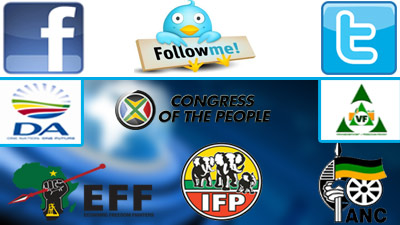An estimated 100 000 people join social platform each month in SA, but analysts say SA political parties are not taking full advantage of social platforms and their audience.
Parties have used social platforms to police each other, slam each other, show off the work they are doing and to make promises about what they plan to do if they win the national or provincial elections.
“Looking at their Twitter pages, it seems they are not really engaging in dialogue and conversation. They are just broadcasting messages without receiving any,” says Steven Bayhack, Fontera Digital Works head of research development.
Bayhack says SA political parties need to understand social platforms better. He says SA political parties need to be more strategic about how they conduct themselves on social media platforms such as Twitter and Facebook.
“They can’t do it in a traditional way of just broadcasting their views. They need to see what other people are using social media for and what other people are saying about them. They need to understand that it is a two way street,” says Bayhack.
Competition is hectic for political parties on social platforms as electioneering momentum grows ahead of the 2014 national elections.
Political parties continue to fight over SA’s relatively small social media audience.
The country’s fifth election has so far witnessed the highest number of political parties participating in social platforms. So far, the main contenders have been ruling party African national congress (ANC) with just over 114k followers, followed by the (DA) with just over 74.6k and new comer Economic freedom Fighters (EFF) with 41.4k followers on Twitter just two weeks before the national elections.
Digital Media and marketing insight company, Apurimac Media, has declared the 2014 national elections “SA’s first digital elections”.
The company conducted independent research and tracked political parties on social media in the run-up to the elections.
Facebook vs Twitter
Apurimac Media managing director, Will Green says different platforms are suited for different things.
Green says Facebook favours political parties as opposed to Twitter, which favours individuals.
He says Facebook is “a platform to connect people around similar trends and interests”.
“So it’s also about what you share within those social media that makes a big influence,” says Green.
He says a lot of parties are not capitalising on the influence they have on social media platforms.
“For example, Jacob Zuma in his profile hasn’t tweeted at all throughout the campaign” notes Green.
Green says Twitter favours personalities and people and political leaders need to use that to their advantage.
“On complete opposite of that, we see Helen Zille and DA tweeting a lot.”
On the week of April 18th-21th, DA party leader Helen Zille tweeted 634 times versus AgangSA leader Mamphela Ramphele 166 times and Economic freedom Party Julius Malema tweeting 109 times and Jacob Zuma having zero tweet.
“We also noticed how Jacob Zuma’s profile name is ‘@SAPresident’ while other party leaders and individuals are in their own capacity. It says a lot to their followers,” says Green.
Behind the numbers
SA currently has an estimated 9,4m active Facebook users and 5,5m Twitter users, according to research by World Wide Worx.
This is a small number considering SA has an estimated population of 53m people.
Green notes how the data collected on political parties social media doesn’t reflect if the people following or engaging with SA political parties online are in South Africa and whether or not the people commenting will be voting in the 2014 national elections.
“It is a way in which we can get a dip-stick research and see what the sentiment is around us,” says Green.
– By Matiba Mutheiwana


